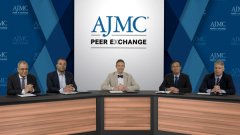
Assessing Cost-Effective Treatment Options in HCC
Cost-effectiveness considerations are highlighted by Dr Abou-Alfa.
Episodes in this series

The video discussion revolves around the critical elements of managing hepatocellular carcinoma (HCC) and the complexities involved in assessing the cost-effectiveness of various treatment strategies. The experts delve into the multifaceted nature of evaluating treatment pathways and emphasize the significance of considering clinical efficacy, safety, and cost-effectiveness in the absence of direct head-to-head data.
Abou-Alfa highlights the challenge of determining the quality of life for patients undergoing treatment, emphasizing the need to consider both survival duration and functionality. The group acknowledges the lack of comprehensive data in HCC-specific studies but draw parallels to other diseases like lung cancer to emphasize the importance of patient-centric perspectives in treatment evaluations.
The panel underscores the impact of checkpoint inhibitors on patients’ well-being, sharing anecdotes of patients experiencing significant pain reduction after initiating specific therapies. They emphasize the importance of minimizing hospital visits and interventions to enhance patients’ quality of life. Practical considerations, such as waiting times for certain procedures and patient accessibility to clinics, are also highlighted as key factors affecting the overall patient experience.
The conversation extends to the challenges posed by vulnerable patients and the need for individualized treatment approaches, considering factors like transportation constraints and barriers to accessing care. They stress the importance of shared decision-making and patient-centered care in developing treatment plans tailored to individual needs and circumstances.
Throughout the discussion, the experts refer to several clinical trials, including the IMbrave150 trial and the HIMALAYA study, underscoring the potential implications of these studies on shaping future treatment paradigms. They mention specific experts in the field such as Abou-Alfa, Haumschild, Salem, and Dietrich, highlighting their contributions to the understanding of HCC management.
In conclusion, the panel emphasizes the need for a holistic approach to treatment that encompasses not only clinical effectiveness and safety but also factors such as patient quality of life, accessibility, and individual vulnerabilities. By acknowledging the multifaceted nature of HCC management, the experts advocate for tailored treatment strategies that prioritize patient well-being and overall quality of life.
Newsletter
Stay ahead of policy, cost, and value—subscribe to AJMC for expert insights at the intersection of clinical care and health economics.










